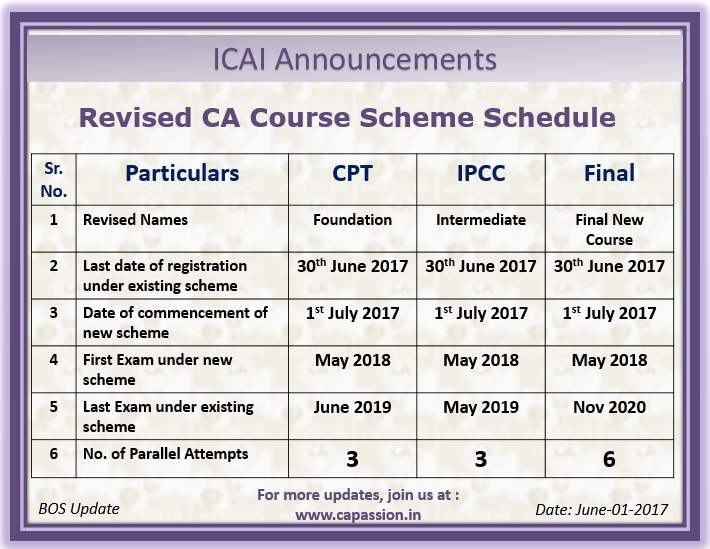ICAI Syllabus New Course
ICAI Syllabus New Course ICAI has provided the New course syllabus for CA Exams. We are providing the full syllabus for the new course for CA Final subjects. This will help students to study their course in a proper way. We have also written an article providing tips to score good marks in exams. You can view this article in this link- Click Here Learn: ICAI Exam- CPT/IPCC/FINAL ICAI CA Final Course ICAI Syllabus New Course There are 8 papers in CA Final Exams, which are further divided into 2 groups. Group 1 contains 4 papers- Paper 1- Financial Reporting Paper 2- Strategic Financial Reporting Paper 3- Advanced Auditing & Professional Ethics Paper 4-Corporate & Economic laws Group 2 consists of 4 paper- Paper 5- Strategic Cost Management & Performance Evaluation Paper 6A- Risk Management Paper 6B- Financial Services & Capital Markets Paper 6C-International Taxation Paper 6D- Economic Laws Paper 7- Direct tax laws Paper 8- Indirect Tax laws PAPER – 1: FINANCIAL REPORTING (One paper – Three hours – 100 Marks) Contents: Application of Existing Accounting Standards 15, 21, 23, 25, 27 and 28. (The students will also be required to apply other Accounting Standards if applicable in any of the questions). Application of Guidance Notes issued by ICAI on specified accounting aspects. Framework for Preparation and Presentation of Financial Statements in accordance with Indian Accounting Standards (Ind AS). Application of Indian Accounting Standards (Ind AS) with reference to General Purpose Financial Statements Consolidated and Separate Financial Statements (as per Ind AS) Application of Industry specific and Transaction Specific Indian Accounting Standards (other than Business Combination, Financial Instruments and Share Based Payment) Business Combinations and Accounting for Corporate Restructuring (including demerger)(as per Ind AS) Accounting and Reporting of Financial Instruments (as per Ind AS) Accounting for Share Based Payment (as per Ind AS) Analysis of Financial Statements Common defects in financial statements of corporate entities Accounting for Carbon Credits Accounting for E-commerce Emerging trends in Reporting (i) Integrated Reporting (ii) Corporate Social Responsibility Reporting (iii) Human Resource Reporting (iv) Value Added Statement Notes: If either a new Indian Accounting Standard (Ind AS) or Accounting Standard (AS) or Announcements and Limited Revisions to Ind AS / AS are issued or the earlier one are withdrawn or new Ind AS / AS, Announcements and Limited Revisions to Ind AS / AS are issued in place of existing Ind AS / AS, Announcements and Limited Revisions to Ind AS / AS, the syllabus will accordingly include / exclude such new developments in the place of the existing ones with effect from the date to be notified by the Institute. The specific inclusions/exclusions in any topic covered in the syllabus will be effected every year by way of Study Guidelines. The list of Guidance Notes in Accounting and significant Expert Advisory Opinions, wherever applicable, will also form part of the Study Guidelines. PAPER – 2 : STRATEGIC FINANCIAL MANAGEMENT (One paper – Three hours – 100 marks) Contents: Financial Policy and Corporate Strategy (i) Strategic decision making framework (ii) Interface of Financial Policy and strategic management (iii) Balancing financial goals vis-à-vis sustainable growth. Indian Financial System (i) Introduction to Financial Market (ii) Role of Financial Market in Economic Development Risk Management (i) Identification of types of Risk faced by an organisation (ii) Evaluation of Financial Risks (iii) Value at Risk (VAR) (iv) Evaluation of appropriate method for the identification and management of financial risk. Security Analysis (i) Fundamental Analysis (ii) Technical Analysis a) Meaning b) Assumptions c) Theories and Principles d) Charting Techniques e) Efficient Market Hypothesis (EMH) Analysis Security Valuation (i) Theory of Valuation (ii) Return Concepts (iii) Equity Risk Premium (iv) Required Return on Equity (v) Discount Rate Selection in Relation to Cash Flows (vi) Approaches to Valuation of Equity Shares (vii) Valuation of Preference Shares (viii) Valuation of Debentures/ Bonds Portfolio Management (i) Portfolio Analysis (ii) Portfolio Selection (iii) Capital Market Theory (iv) Portfolio Revision (v) Portfolio Evaluation (vi) Asset Allocation (vii) Fixed Income Portfolio (viii) Risk Analysis of Investment in Distressed Securities (ix) Alternative Investment Strategies in context of Portfolio Management Securitization (i) Introduction (ii) Concept and Definition (iii) Benefits of Securitization (iv) Participants in Securitization (v) Mechanism of Securitization (vi) Problems in Securitization (vii) Securitization Instruments (viii) Pricing of Securitization Instruments (ix) Securitization in India Mutual Fund (i) Meaning (ii) Evolution (iii) Types (iv) Advantages and Disadvantages of Mutual Funds Derivatives Analysis and Valuation (i) Forward/ Future Contract (ii) Options (iii) Swaps (iv) Commodity Derivatives Foreign Exchange Exposure and Risk Management (i) Exchange rate determination (ii) Foreign currency market (iii) Management of transaction, translation and economic exposures (iv) Hedging currency risk (v) Foreign exchange derivatives – Forward, futures, options and swaps International Financial Management (i) International Capital Budgeting (ii) International Working Capital Management a) Multinational Cash Management Objectives of Effective Cash Management Optimization of Cash Flows/ Needs Investment of Surplus Cash b) Multinational Receivable Management c) Multinational Inventory Management Interest Rate Risk Management (i) Interest Rate Risk (ii) Hedging Interest Rate Risk a) Traditional Methods b) Modern Methods including Interest Rate Derivatives Corporate Valuation (i) Conceptual Framework of Valuation (ii) Approaches/ Methods of Valuation a) Assets Based Valuation Model b) Earning Based Models c) Cash Flow Based Models d) Measuring Cost of Equity Capital Asset Pricing Model (CAPM) Arbitrage Pricing Theory Estimating Beta of an unlisted company e) Relative Valuation Steps involved in Relative Valuation Equity Valuation Multiples Enterprise Valuation Multiple f) Other Approaches to Value Measurement Economic Value Added (EVA) Market Value Added (MVA) Shareholder Value Analysis (SVA) g) Arriving at Fair Value Mergers, Acquisitions and Corporate Restructuring (i) Conceptual Framework (ii) Rationale (iii) Forms (iv) Mergers and Acquisitions a) Financial Framework b) Takeover Defensive Tactics c) Reverse Merger (v) Divestitures a) Partial Sell off b) Demerger c) Equity Carve outs (vi) Ownership Restructuring a) Going Private b) Management/ Leveraged Buyouts (vii) Cross Border Mergers International Financial Centre (IFC) (i) Constituents of IFC (ii) Islamic Finance a) Major difference between Islamic Finance and other forms of

